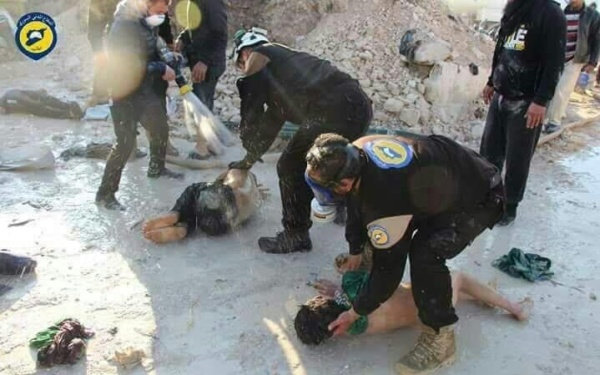White Helmets rescuers treat victims of the Assad regime’s sarin attack on Khan Sheikhoun in northwest Syria, April 4, 2017
A senior UN official has told the Security Council that the Assad regime, following more than 300 chlorine and sarin attacks across Syria since 2012, is still refusing to cooperate over its chemical weapons stocks and facilities.
Speaking on behalf of the UN’s High Representative for Disarmament Affairs Izumi Nakamitsu, deputy Adedeji Ebo provided the Council with a monthly briefing on the implementation of Resolution 2118 — adopted after the regime’s sarin attacks near Damascus killed more than 1,400 civilians — for the elimination of the Syrian chemical weapons program.
Ebo highlighted that “long-standing gaps, inconsistencies and discrepancies remain unresolved”.
For months, the regime has blocked the visit of a full team from the UN’s Organization for the Prohibition of Chemical Weapons, denying visas, and has moved suspect material and cylinders which can no longer be found.
See also OPCW: Assad Regime Still Covering Up Deadly Chemical Attacks
Ebo said the OPCW has notified the regime that it will send a smaller group for “limited in-country activities” from January 17-22.
The official emphasized that the regime’s declaration of its program “cannot be considered accurate and complete in accordance with the Chemical Weapons Convention”.
He added, “It is imperative to hold accountable all those who would dare to use chemical weapons.”
The Assad regime’s UN Ambassador, Bassam Sabbagh, insisted that Damascus is “determined to cooperate” with the OPCW to close “the chemical file”.
Russia, the regime’s essential enabler, repeated its standard line that the Council’s discussion was serving the “domestic political objectives” of Western countries.
But Japan, the Council President for January, pushed back:
It should also refrain from making further excuses to impede the entry of the Declaration Assessment Team’s technical expert to its territory.

